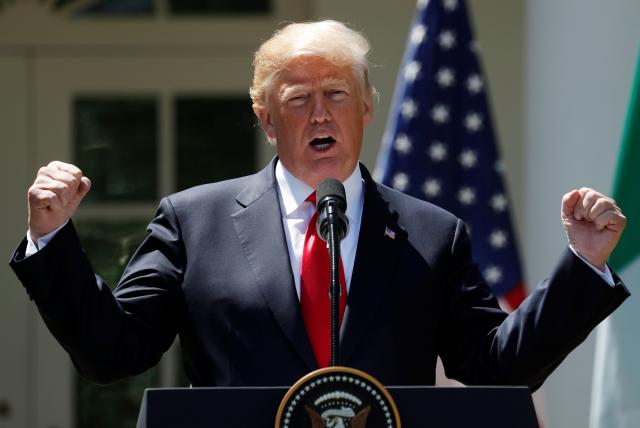Trump has threatened to withdraw from the accord, which lifted economic sanctions on Iran in exchange for Tehran limiting its nuclear ambitions, unless European signatories to the deal fix what he has called its shortcomings.
“I will be announcing my decision on the Iran Deal tomorrow from the White House at 2:00pm,” Trump said in a Twitter post on Monday.
The American president has until May 12 to decide whether to reintroduce U.S. sanctions on Iran, which would deal a heavy blow to the agreement.
Ending U.S. sanctions relief could also trigger a backlash by Iran, which could resume its nuclear arms program or punish U.S. allies in Syria, Iraq, Yemen and Lebanon, diplomats said.
Trump has all but decided to withdraw from the accord but exactly how he will do so remains unclear, two White House officials and a source familiar with the administration’s internal debate told Reuters last week.
One of the White House officials said it was possible Trump will end up with a decision that “is not a full pullout,” but was unable to describe what that might look like.
Under the agreement with the United States, France, Germany, Britain, Russia and China, Iran strictly limited uranium enrichment capacity to try to show that it was not trying to develop atomic bombs. In exchange, Iran received relief from economic sanctions.
Iranian President Hassan Rouhani hinted on Monday that Iran could remain in the accord even if the United States dropped out, but said that Tehran would fiercely resist U.S. pressure to limit its influence in the Middle East.
Rouhani said the Islamic Republic had been preparing for every possible scenario, including a deal without Washington - which would still include the other signatories that remain committed to it - or no deal at all.
“We are not worried about America’s cruel decisions...We are prepared for all scenarios and no change will occur in our lives next week,” Rouhani said in a speech broadcast live on state TV.
“If we can get what we want from a deal without America, then Iran will continue to remain committed to the deal. What Iran wants is our interests to be guaranteed by its non-American signatories ... In that case, getting rid of America’s mischievous presence will be fine for Iran.”
Britain, France and Germany remain committed to the accord and, in an effort to address U.S. complaints, want to open talks on Iran’s ballistic missile program, its nuclear activities beyond 2025 - when pivotal provisions of the deal expire - and its role in the wars in Syria and Yemen.
British Foreign Secretary Boris Johnson, in Washington for talks this week, said the deal had weaknesses but these could be remedied.
“At this moment Britain is working alongside the Trump administration and our French and German allies to ensure that they are,” he said in a commentary in the New York Times.
Johnson met U.S. Secretary of State Mike Pompeo and Vice President Mike Pence on Monday.
















































